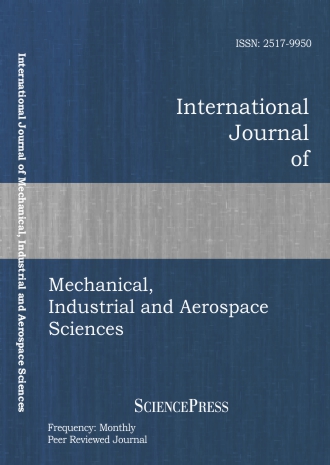
Scholarly
Volume:4, Issue: 9, 2010 Page No: 856 - 862
International Journal of Mechanical, Industrial and Aerospace Sciences
ISSN: 2517-9950
1728 Downloads
Visual Study on Flow Patterns and Heat Transfer during Convective Boiling Inside Horizontal Smooth and Microfin Tubes
Evaporator is an important and widely used heat exchanger in air conditioning and refrigeration industries. Different methods have been used by investigators to increase the heat transfer rates in evaporators. One of the passive techniques to enhance heat transfer coefficient is the application of microfin tubes. The mechanism of heat transfer augmentation in microfin tubes is dependent on the flow regime of two-phase flow. Therefore many investigations of the flow patterns for in-tube evaporation have been reported in literatures. The gravitational force, surface tension and the vapor-liquid interfacial shear stress are known as three dominant factors controlling the vapor and liquid distribution inside the tube. A review of the existing literature reveals that the previous investigations were concerned with the two-phase flow pattern for flow boiling in horizontal tubes [12], [9]. Therefore, the objective of the present investigation is to obtain information about the two-phase flow patterns for evaporation of R-134a inside horizontal smooth and microfin tubes. Also Investigation of heat transfer during flow boiling of R-134a inside horizontal microfin and smooth tube have been carried out experimentally The heat transfer coefficients for annular flow in the smooth tube is shown to agree well with Gungor and Winterton-s correlation [4]. All the flow patterns occurred in the test can be divided into three dominant regimes, i.e., stratified-wavy flow, wavy-annular flow and annular flow. Experimental data are plotted in two kinds of flow maps, i.e., Weber number for the vapor versus weber number for the liquid flow map and mass flux versus vapor quality flow map. The transition from wavy-annular flow to annular or stratified-wavy flow is identified in the flow maps.
Authors:
References:
[1] Bergles, AE & Suo, M. Investigation of boiling water flow